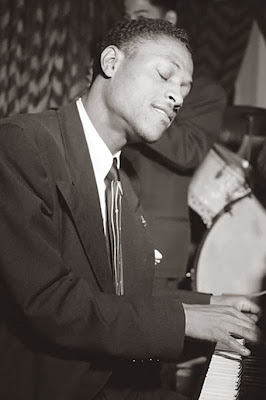Eddie Heywood (born Edward Heywood, Jr., 4 December 1915, Atlanta, Georgia – 3 January 1989, Miami Beach, Florida) was a jazz pianist who was popular in the 1940s. His father, Eddie Heyward, Sr. was also a jazz musician from the 1920s. Eddie is probably most remembered now for originating the much-loved song, “Canadian Sunset.” But Heywood’s story encompasses so  much more, including not only his early experiences in the big band era but also having to overcome bouts of paralysis in his later years.
much more, including not only his early experiences in the big band era but also having to overcome bouts of paralysis in his later years.
 much more, including not only his early experiences in the big band era but also having to overcome bouts of paralysis in his later years.
much more, including not only his early experiences in the big band era but also having to overcome bouts of paralysis in his later years. He had early training as an accompanist from his father, who led the pit band in an Atlanta vaudeville theater. At the age of 12 he occasionally played piano in his father's band and accompanied such singers as Bessie Smith and Ethel Waters. When pictures with sound began replacing vaudeville, Mr. Heywood moved to New Orleans and then to Kansas City, Mo., where he was playing in Wayman Carver's band in 1932 and Clarence Love's band from 1934 to
 1937. Heywood, Jr. played with several popular jazz musicians such as and Benny Carter from 1939 to 1940 after moving to New York.
1937. Heywood, Jr. played with several popular jazz musicians such as and Benny Carter from 1939 to 1940 after moving to New York. When the band broke up the following year, he became the house pianist at the Village Vanguard in Greenwich Village, where he led a trio and accompanied singers, among them the Revuers, a group that included Judy Holliday, Betty Comden and Adolph Green. After starting his band, Heywood would occasionally do back-up for Billie Holiday in 1941.
In 1943, at the urging of John Hammond, the jazz authority whose interest had nurtured the careers of Count Basie, Billie Holiday and Benny Goodman, Mr. Heywood took several classic solos on a Coleman Hawkins quartet date (including "The Man I Love") and put together the first sextet, including Doc Cheatham and Vic Dickenson. Eddie and his sextet played at the Cafe Society Downtown, being billed as the "Biggest Little Band in the Land".
The type of music they played, and their billing, placed them in direct competition with John Kirby. The group played in a crisp, stylized manner that was an adaptation of Mr. Heywood's playing as a solo pianist.He had been playing ''Begin the Beguine'' in this fashion as a piano soloist and he arranged it for his sextet in the same way. It was an immediate success and it set a pattern for the group's playing that appealed equally to jazz fans and followers of pop music. After their version of "Begin the Beguine" became a hit in 1944, they had three successful years ahead of them.
 recorded with Hugo Winterhalter and his orchestra. After a second partial paralysis in the 1960s, Heywood made another comeback and continued his career in the 1980s. By this time he was working in the field of light music rather than jazz.
recorded with Hugo Winterhalter and his orchestra. After a second partial paralysis in the 1960s, Heywood made another comeback and continued his career in the 1980s. By this time he was working in the field of light music rather than jazz.In his later years Eddie suffered from Parkinson's disease, later complicated with Alzheimer's disease, and had been in frail health since the mid 80's. He died 3 January 1989.
Eddie Heywood has a "Star" at 1709 Vine Street on the Hollywood Walk of Fame. (Info various sources inc. New York Times & Wikipedia)



For Eddie Heywood with Hugo Winterhalter Orchestra -
ReplyDelete''An Affair To Remember'' (1964) go here;
http://turbobit.net/eqjtgx6azu9p.html
01.Ebb Tide
02.Love Letters
03.Stella By Starlight
04.Ruby
05.And This Is My Beloved
06.An Affair To Remember
07.Penthouse Serenade (When We're Alone)
08.New York's My Home
09.Broadway Rhythm
10.The Trolley Song
A big thankyou to Forgotten Masterpieces blog for this link
For Eddie Heywood - The Chronological Classics, 4 Albums 1944 - 1951 go here:
ReplyDeletehttp://dfiles.eu/folders/HAU55629J